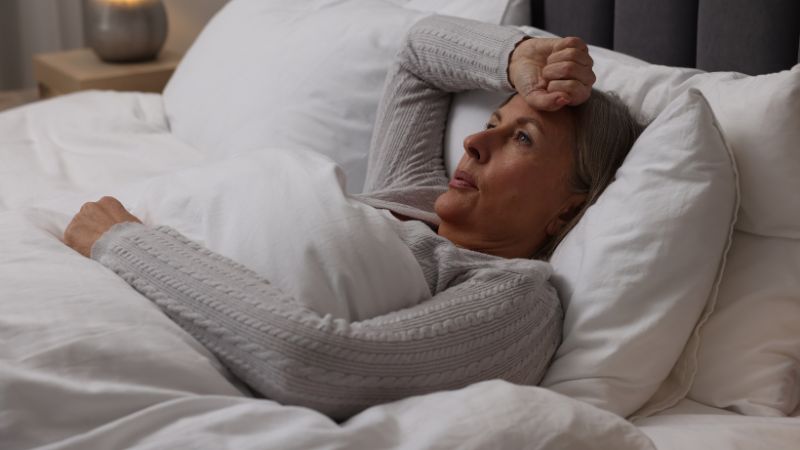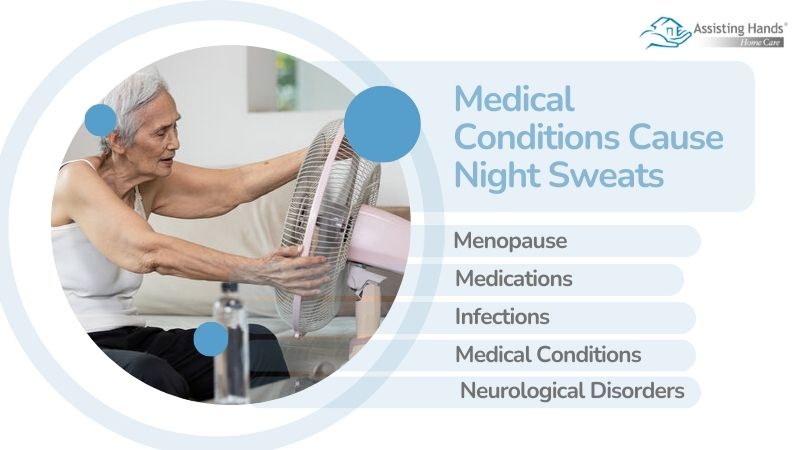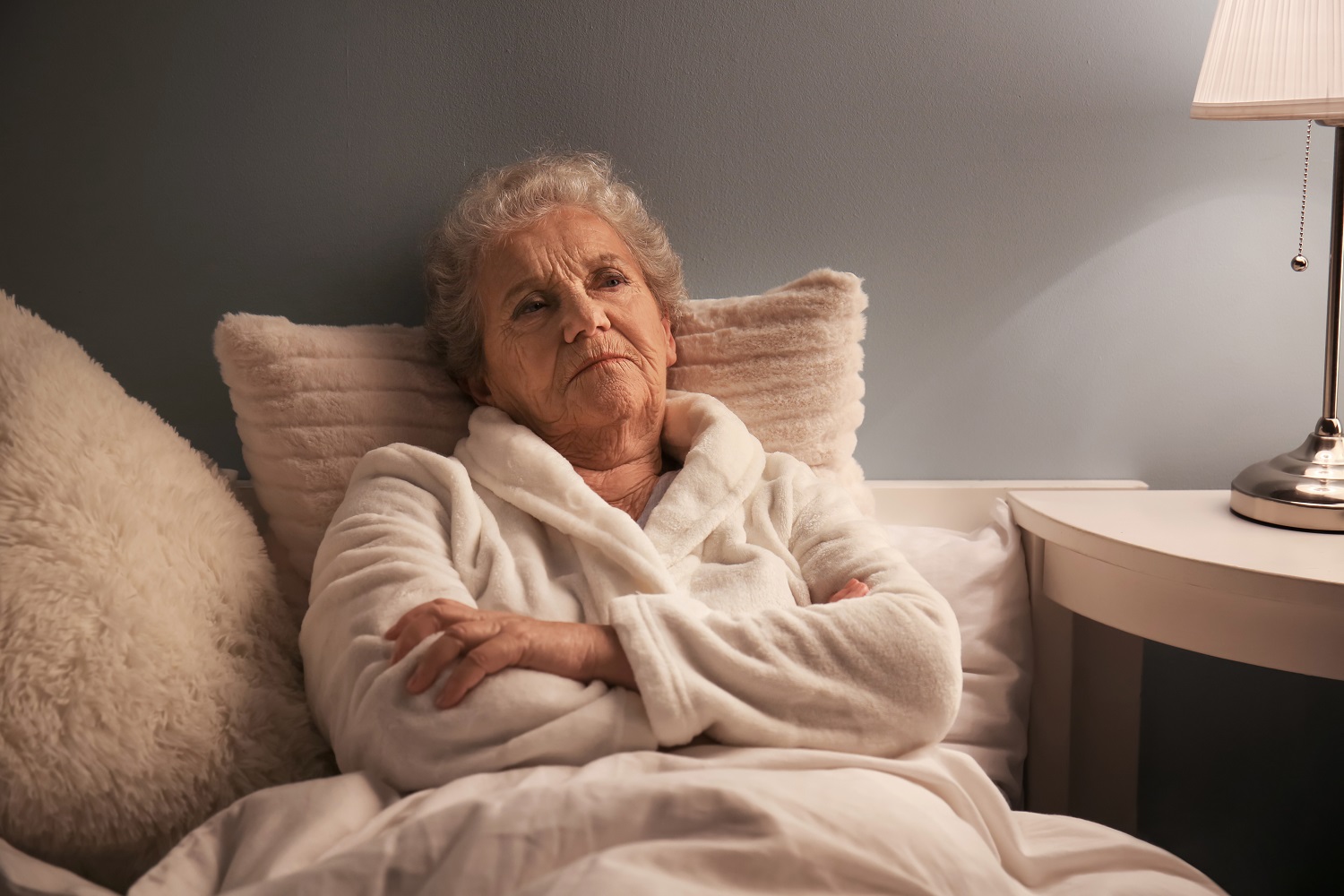
Key Summary: Night sweats in elderly women can be caused by various factors such as menopause, medications, infections, medical conditions, or even a vitamin B12 deficiency. If night sweats are frequent or severe, especially when accompanied by symptoms like fatigue or unexplained weight loss, it's important to consult a doctor. To manage night sweats, keeping the bedroom cool, wearing breathable clothing, and avoiding foods like spicy dishes or caffeine before bed can make a difference.
Elderly women may find themselves drenched in sweat as they sleep. Although uncommon, night sweats can affect seniors for a number of reasons. Talking to a healthcare provider can pinpoint the cause and lead to effective treatment. The following are causes of night sweats in older women.
Sweating in general is a healthy bodily response. Perspiration keeps the body cool and comfortable. On the other hand, night sweats are a far more dramatic event. Seniors who experience night sweats wake up from nighttime sleep and experience severe discomfort.
Night sweats are characterized by extreme heat. The senior’s body is overcome by a wave of heat. Sweating, chills, and a rapid heartbeat can follow. The older woman wakes up from her sleep, oftentimes feeling confused as to the causes of her symptoms.
Table of Contents
ToggleWhat medical conditions cause night sweats?

1. Menopause
Menopause is a common cause of night sweats in women older than 51, the average age that menstruation stops. Hormone levels change during menopause, which may cause the hypothalamus (which controls the part of the brain that regulates heat) difficulty with temperature regulation.
2. Medications
Certain medications are known to cause excessive sweating. Diabetes medications, for instance, affect blood sugar levels. Oral diabetes medications and insulin can cause the blood sugar levels to drop. Low blood sugar (known as hypoglycemia) can be accompanied by sweating.
Aging women who take antidepressants can also experience night sweats. Anywhere from 8 to 22 percent of people who are prescribed these drugs sweat heavily at night. Antipsychotic drugs are also responsible for causing excessive sweating in the people who take them.
Medications that affect the hormones can likewise cause night sweats. Elderly cancer patients, for example, who are prescribed tamoxifen or aromatase inhibitors, which are hormone therapies used to treat breast cancer, are likely to experience hot flashes and night sweats.
3. Infections
When accompanied by fever, infections can lead to night sweats. Excessive sweating at night is a predominant symptom of several infectious diseases, including bacterial infections, malaria, tuberculosis, human immunodeficiency virus (HIV), and Covid-19. Diseases transmitted through tick bites can also cause night sweats.
4. Medical Conditions
Certain diseases can cause night sweats. Aside from serious infections, like endocarditis, night sweats may be caused by rheumatoid arthritis and other autoimmune disorders, heart disease, hyperthyroidism (overactive thyroid), obesity, and some cancers, such as prostate cancer, lymphoma, and leukemia.
5. Neurological Disorders
Certain neurological conditions can interfere with the body's ability to regulate temperature, leading to excessive sweating, including night sweats. These disorders affect the nervous system, which controls sweat production and overall body functions.
Autonomic dysreflexia is a serious condition that primarily affects individuals with spinal cord injuries. It occurs when the nervous system overreacts to stimuli, causing sudden spikes in blood pressure, excessive sweating, headaches, nausea, and a slowed heart rate. Since this condition can lead to life-threatening complications, immediate medical attention is necessary.
Parkinson’s disease is another neurological disorder that can impact temperature regulation. People with Parkinson’s often experience night sweats due to disruptions in the autonomic nervous system, which controls involuntary functions like sweating. Other symptoms include tremors, muscle stiffness, slowed movements, and difficulty sleeping, all of which can contribute to discomfort.
Brain injuries, including strokes, can also lead to temperature regulation issues. Damage to the brain, particularly in areas that control sweating, can result in abnormal sweating patterns, including excessive night sweats.
When should you be concerned about night sweats?

Night sweats are oftentimes a result of benign causes. However, being drenched in sweat at night can worry any older adult. Elderly women who are concerned about this condition should speak to their physicians. A medical evaluation may be necessary under certain circumstances.
Discuss night sweats with a doctor when the senior wakes up soaked in such a high amount of sweat that the clothes and bedding need to be changed. Occasional night sweats are not worrisome; however, frequent night sweats should be discussed with a physician.
Speaking with a medical professional can ease symptoms when the night sweats disrupt sleep, causing the senior to feel unrested during the day. When night sweats are accompanied by swollen lymph nodes, fatigue, breathing problems, cough, or unexplained weight loss, consult a physician.
What deficiency causes night sweats?
A deficiency in one important nutrient can be the cause of night sweats. Vitamin B12 deficiency is not only common, but it is responsible for a wide range of neurological syndromes. Older women who undergo vitamin B12 therapy can reduce sweating heavily at night.
Seniors can consume a healthy dose of vitamin B12 through natural sources, like fish, eggs, meats, shellfish, and milk. However, the aging process can cause the body to improperly digest and absorb vitamin B12. In these cases, a daily supplement can boost vitamin B12 levels.
Elderly women who experience night sweats can take steps to improve their sleep quality. The goal is to keep cooler during bedtime, which can be accomplished by lying on pillows or a mattress cover that contains cooling gels. Use lightweight, layered bedding that can be removed at night.
Turn on the bedroom ceiling fan, open windows, or turn on the air conditioner during nighttime sleep. Place a cooling pack under the pillow, then flip the pillow to rest on the cooler surface. Seniors are also advised to wear loose-fitting cotton pajamas to bed.
Night sweats can be triggered by certain foods and drinks. Avoid eating spicy foods and drinking caffeinated beverages before bed. While exercising immediately before bed is not recommended, engaging in physical activity earlier in the day can help seniors sleep better at night.
Aging women can feel startled when they wake up soaked in sweat. Having a compassionate caregiver by their side can ease the discomfort they feel. Overnight care from Assisting Hands Home Care can be the solution when seniors are concerned about frequent night sweating.
Our professional overnight caregivers remain awake throughout the night as the senior sleeps. We tend to her care needs, such as helping her to the bathroom, providing transfer assistance, giving medication reminders, and responding quickly to emergencies. We also help them with their morning routine.
Assisting Hands Home Care overnight caregivers are licensed, bonded, and insured to give families and their aging loved ones maximum peace of mind. We are also trained in CPR and First Aid. Our professionals consistently receive high ratings from families and the elderly.
Overnight care is ideal for seniors who require monitoring and support at night. Older adults who are prone to falling benefit from our supervision. Seniors who are recuperating from a surgery sleep better when our caregivers help them change position. Dementia patients, too, remain safe under our care.
When your elderly loved one needs extra support at night, choose Assisting Hands Home Care. Our senior care services are available to older adults. Schedule a complimentary in-home consultation. Call today for exceptional elder home care at (888) 559-3889.
Frequently Asked Questions
What lifestyle changes can help reduce night sweats?
To help reduce night sweats, follow these tips:
- Keep the bedroom cool with a fan or light bedding.
- Wear loose, comfortable clothes made of breathable fabric for sleep.
- Drink plenty of water during the day to stay hydrated.
- Practice relaxation techniques like deep breathing or meditation to manage stress.
- Avoid spicy foods, alcohol, and caffeine before bedtime, as they can worsen night sweats.
Can sleep disorders contribute to night sweats?
Sleep apnea and other sleep disorders can cause night sweats due to irregular breathing patterns and fluctuations in oxygen levels during sleep.
What deficiency causes night sweats?
Vitamin B12 deficiency is often seen and can cause a range of neurological problems, including issues with the autonomic nervous system. In three cases, intense night sweats were found to be caused by this deficiency.
What organ controls night sweats?
The central nervous system, mainly through the thalamus, controls night sweats. This process can be triggered by various factors, including underlying health conditions and the use of specific medications.
What tests should be done for night sweats?
Several tests may be recommended to determine the cause of night sweats, depending on the symptoms and medical history. Common tests include:
- Blood Tests: To check for infections, hormonal imbalances (like thyroid function), or vitamin deficiencies (such as vitamin B12 or iron).
- Chest X-ray: To rule out lung infections, such as tuberculosis, or other respiratory conditions.
- Urine Tests: To detect infections or kidney issues.
- Sleep Studies: If sleep disorders like sleep apnea are suspected.
- Imaging Tests (CT or MRI scans): To check for neurological conditions or tumors.
- Biopsy or Bone Marrow Test: If an underlying cancer, such as lymphoma, is suspected.
Your doctor will decide on the appropriate tests based on your symptoms, age, and medical history















